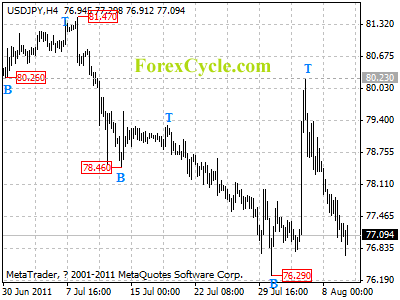Over the past year we’ve spent a great deal of time pointing out the lies, called “revisions,” from President Obama and our Fed Chief, Big Ben Bernanke. We take no joy in calling your attention to the massive deficit of action from these two.
But when you’re right… you’re right. In the past two weeks alone:
- We’ve shown you that real unemployment numbers are in excess of 20%.
- The 2008-09 recession should really have been called a depression.
- And our 2011 first-quarter GDP wasn’t anything close to what both of these proclaimed as a slow, steady, progress to recovery.
The truth is, our economy is still a disaster.
Now we’ve been treated to the grandest revision of them all: Friday afternoon Standard & Poor’s lowered the U.S. credit rating to AA+. Of course, I’m no fan of S&P. I’ve written pretty extensively about my feelings on the three ratings agencies. They provide little useful information and never in a timely manner.
While the downgrade caught the rest of the world by surprise, it didn’t surprise our readers. That’s because we’ve written about it for more than a year and have taken full advantage of it.
Sometimes it’s a difficult call. Others times, like when a politician stands up and adamantly denies or proclaims anything, rest assured it’s probably already happened.
One of the earliest signs the U.S. debt was in serious trouble came on February 7, 2010, in a news interview on ABC’s This Week, when none other than U.S. Treasury Secretary Timothy Geithner was asked if the U.S. would lose our Triple-A rating. He responded:
“Absolutely not. And that will never happen to this country.”
When a politician says anything is an absolute, take the other side of the bet. (Think Monica Lewinski and Clinton’s infamous quote, “I never had sexual relations with that women,” if you’re looking for an obvious example.)
Mr. Geithner probably should have been reading our publications. If so, he would have had advance knowledge that this downgrade was coming.
You see, Taipan readers were told a year ago that Dagong Global Credit Rating Company announced they were getting into the sovereign debt evaluation game:
“China’s leading credit rating agency,” the U.K.’s Telegraph reports, “has stripped America, Britain, Germany and France of their AAA ratings, accusing Anglo-Saxon competitors of ideological bias in [favor] of the West.”
— Justice Litle, Taipan Daily, July 2010
The Chinese aren’t the only ones who spotted the obvious and wrote about it.
The Financial Times reported on July 18, 2011, that
Egan-Jones has become the first U.S. rating agency to downgrade the country’s sovereign credit rating from triple A to double A plus as it focuses on the rapid rise in outstanding debt over the past five years.
I’m guessing you’ve never heard of Egan-Jones.
There’s good reason. This little research company is private. In other words, it doesn’t have the U.S. seal of approval as do the S&P, Fitch and Moody’s.
Egan-Jones is paid to perform and doesn’t have the government sponsorship the other three enjoy. Institutions pay Egan-Jones to anticipate what will happen in advance of market actions, the other three tell you what you already know.
You tell me — which is more useful?
Now I would like to give credit where due, and S&P has performed a real service if their actions stir any positive steps in Washington. I’m not holding my breath, but at least the media is reporting it, unlike the Egan-Jones’ or Dagong’s downgrades.
Of course, Timmy G. tells us S&P is wrong. He said that S&P’s math was inaccurate by a couple trillion dollars. In the same breath he acknowledged the U.S. deficit is unsustainable.
Timmy G. went so far as to say the actions showed “terrible judgment” and “a stunning lack of knowledge about the basic U.S. fiscal budget math.”
For an Obama insider to accuse anyone of poor judgment and lack of knowledge of basic math is the ultimate in hypocrisy. Washington is the very definition of these qualities.
And as Rome burns, not even a note from the fiddle of President Obama.
As I write, Treasury bonds are rallying, markets are swinging wildly, and the media and politicians are blaming the Tea Party for asking the U.S. to stop borrowing and spending.
Unfortunately, we’ll hear nothing from our presidential hopefuls. This speaks volume to their leadership character, or lack thereof. I will have to exclude Tea Party favorite Ron Paul, who may have been the only one warning of this longer than the writers here.
P.S. One unintended consequence may be a flood of municipal bonds entering the market if their triple-A ratings are tied to Treasuries. If this happens, prices for munis may get cheap and worthy of consideration.
Written by Joseph McBrennan for Taipan Publishing Group. Additional valuable content can be syndicated via our RSS feed. Check us out on http://www.facebook.com/TaipanGroup or follow us on http://twitter.com/ under Taipan_Trader. Republish without charge. Required: Author attribution, links back to original content or www.taipanpublishinggroup.com.
